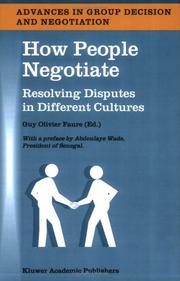| Listing 1 - 10 of 33 | << page >> |
Sort by
|
Book
ISBN: 2729818251 9782729818258 Year: 2005 Publisher: Paris : Ellipses,
Abstract | Keywords | Export | Availability | Bookmark
 Loading...
Loading...Choose an application
- Reference Manager
- EndNote
- RefWorks (Direct export to RefWorks)
Geopolitics --- Géopolitique --- Southeast Asia --- East Asia --- Asie du Sud-Est --- Extrême-Orient --- Politics and government --- Politics and government. --- Economic conditions. --- Politique et gouvernement --- Conditions économiques
Book
ISBN: 9789814313667 9814313661 Year: 2010 Publisher: New Jersey World scientific
Abstract | Keywords | Export | Availability | Bookmark
 Loading...
Loading...Choose an application
- Reference Manager
- EndNote
- RefWorks (Direct export to RefWorks)
Asia --- China --- Japan --- Foreign relations
Book
ISBN: 1283144751 9786613144751 981431367X 9789814313674 9789814313667 9814313661 Year: 2010 Publisher: Hackensack, NJ World Scientific
Abstract | Keywords | Export | Availability | Bookmark
 Loading...
Loading...Choose an application
- Reference Manager
- EndNote
- RefWorks (Direct export to RefWorks)
This book is a study of ties between China and Japan and their Asian counterparts. It does not therefore directly treat bilateral relations between these powers, as these already constitute the subject of many other studies. A lengthy perspective has been taken into account in order to recall past legacies, some of which are still painfully contentious, and to record evolutions in attitudes and strategies vis-a-vis Asian countries.
China --- Japan --- Asia --- Foreign relations
Article
Abstract | Keywords | Export | Availability | Bookmark
 Loading...
Loading...Choose an application
- Reference Manager
- EndNote
- RefWorks (Direct export to RefWorks)
Book
ISBN: 2355960453 2916063331 Year: 2018 Publisher: Bangkok : Institut de recherche sur l’Asie du Sud-Est contemporaine,
Abstract | Keywords | Export | Availability | Bookmark
 Loading...
Loading...Choose an application
- Reference Manager
- EndNote
- RefWorks (Direct export to RefWorks)
L'Asie du Sud-Est est en perpétuelle évolution et, face à une Chine dynamique, l'unité des pays de la région est encore loin d'être une réalité. Les difficultés rencontrées aujourd'hui par certains de ces pays sont-ils simplement les symptômes d'une crise de croissance, ou ont-elles des racines plus profondes ? Asie du Sud-Est 2007 rassemble des textes tirés du mensuel Focus Asie du Sud-Est (Fase) qui intéresseront tout autant le chercheur, l'étudiant que le néophyte. Etablissant une rétrospective des événements majeurs de l'année 2006, ce livre aide à mieux comprendre les grands enjeux de l'année 2007. Fase est la première revue francophone à s'intéresser aux évolutions du sous-continent asiatique. Autour du comité éditorial (Arnaud Dubus, Pierre Paccaud et Jean-Claude Pomonti) s'est constitué un groupe de spécialistes chargés d'enquêter sur le terrain et qui livrent ici le résultat de leurs recherches. Asie du Sud-Est 2007 apporte ainsi un éclairage pertinent et contemporain sur une région émergente, démêle l'éphémère des grandes tendances historiques et déchiffre une actualité riche et multiforme. Cet ouvrage de l'Institut de Recherche sur l'Asie du Sud-Est Contemporaine (Irasec) offre de nombreux outils pratiques tels qu'une chronologie détaillée de l'année 2006, les adresses des différents centres de recherche travaillant sur la région, une bibliographie rassemblant les ouvrages récents, ou encore une liste des formations relatives à l'Asie du Sud-Est.
Economics (General) --- minorités --- urbanisation --- culture --- politique --- capitalisme --- conflit --- économie --- Singapour --- Vietnam --- société civile --- Indonésie --- Asie du Sud-Est --- Malaisie --- Philippines --- Thaïlande --- Asean --- Birmanie --- Timor --- Cambodge --- Laos --- Brunei --- conflict --- politics --- economics --- capitalism --- minorities --- Southeast Asia --- urbanization --- civil society --- Viêt Nam --- Thailand --- political transition --- Myanmar --- Burma --- Malaysia --- economic transition --- Indonesia --- Cambodia --- regional integration --- Timor-Leste --- Singapore

ISBN: 1402018312 Year: 2003 Publisher: Dordrecht : Kluwer,
Abstract | Keywords | Export | Availability | Bookmark
 Loading...
Loading...Choose an application
- Reference Manager
- EndNote
- RefWorks (Direct export to RefWorks)

ISBN: 2846540462 Year: 2004 Publisher: Paris : Bangkok : Les Indes savantes ; IRASEC,
Abstract | Keywords | Export | Availability | Bookmark
 Loading...
Loading...Choose an application
- Reference Manager
- EndNote
- RefWorks (Direct export to RefWorks)
Vietnam --- Japan --- Viêt-nam --- Japon --- Foreign relations --- Relations extérieures

ISBN: 9781402018312 Year: 2003 Publisher: Dordrecht Kluwer Academic Publishers
Abstract | Keywords | Export | Availability | Bookmark
 Loading...
Loading...Choose an application
- Reference Manager
- EndNote
- RefWorks (Direct export to RefWorks)
How People Negotiate brings together a set of negotiation stories, accompanied by an integrative overview. This volume provides cases and theoretical elaboration and includes a comprehensive overview of research on negotiation. Some negotiation stories are exotic and strange: they come from a large number of countries, ranging from China, to African Countries, to the Ancient Middle East. Others are drawn from Western settings such as France, Germany, and USA. The negotiations described take various forms: negotiating with oneself, negotiating one's own way through bicycle traffic or animals appearing to negotiate with each other. The stories begin with Abraham negotiating with the Lord about the fate of Sodom, the first-ever recorded account of negotiations. The negotiations in this volume present something new and unusual. They are catchy, intriguing, exciting, intellectually challenging and original. They give us a new perspective on negotiating, tell us something about the world we live in, and - by means of a worthwhile detour - they teach us about ourselves.
Book
ISBN: 9789971693893 Year: 2008 Publisher: Singapore NUS Press
Abstract | Keywords | Export | Availability | Bookmark
Book
ISBN: 082034382X 9786613925367 1283612917 Year: 2012 Publisher: Athens : University of Georgia Press,
Abstract | Keywords | Export | Availability | Bookmark
 Loading...
Loading...Choose an application
- Reference Manager
- EndNote
- RefWorks (Direct export to RefWorks)
Most studies of international negotiations take successful talks as their subject. With a few notable exceptions, analysts have paid little attention to negotiations ending in failure. The essays in Unfinished Business show that as much, if not more, can be learned from failed negotiations as from successful negotiations with mediocre outcomes.
| Listing 1 - 10 of 33 | << page >> |
Sort by
|

 Search
Search Feedback
Feedback About UniCat
About UniCat  Help
Help News
News